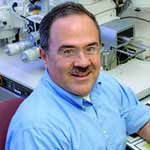

 Prof. E. Terry Papoutsakis
Prof. E. Terry Papoutsakis Since 2007, Eugene DuPont Professor in the University of Delaware Department of Chemical &
Biomolecular Engineering. Diploma in ChE; Nat. Technical Univ. of Athens; MS, PhD: Purdue
University. Started his career at Rice University before moving to Northwestern University where he
served as Walter P. Murphy Professor until he left in 2007.
Important research contributions in animal-cell biotechnology; clostridia genetics and metabolic
engineering; & stem-cell bioengineering. Has trained 65 PhD, 27 MS, 34 postdoctoral engineers and
scientists. Over $35 millions in research grants from NIH, NSF, DOE, NASA, ARPA-E & EPA. Over
250 papers; 15,000 citations, h=71 (GS). Over 15 patents.
The concept of proteins a therapeutics emerged relatively late (late 1970s), later in fact that the concept of gene therapies. Yet, and despite the resistance from the big Pharma companies, protein therapeutics reached the market in the late 1980s. This was achieved to a large measure by the enormous strides made by chemical engineering in developing the sophisticated mammalian-cell culture technologies needed to produce these complex proteins. This $150B+ industry, now largely based on monoclonal antibodies to treat of large array of human diseases, is growing by 10-15% a year. New applications in immunotherapies and cell therapies are now fueling an even faster growth. I will review the history of, and the role of chemical engineering in, these technologies.